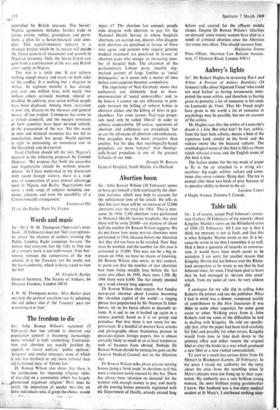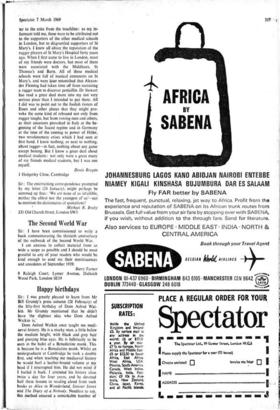Table talk Sir: I, of course, accept Paul Johnson's correc-
tion (Letters, 28 February) of my remarks about Kingsley Martin's views on the Rhineland crisis of 1936 (21 February). All I can say is that I think my memory is not at fault, and that this is what Kingsley Martin wrote to me. It is be- cause he wrote to me that I remember it so well. Had it been a question of remarks in conversa- tion, it would have been much easier to be mistaken. I am sorry for another reason that Kingsley Martin did not behave over the Rhine- land occupation as he wrote to me that he had behaved since, for once, I had been glad to learn that he had managed to 'deviate into sense' wbich, from my point of view, he very seldom did.
I apologise for my silly slip in calling John Roberts the printer and not the publisher. What I had in mind was a dinner, composed mainly of contributors to the New Statesman (I was there in some other capacity), for some good cause or other. Walking away from it, John Roberts told me some of the difficulties he had in dealing with Kingsley. He told me specific- ally that, after the paper had been read carefully Tor libel and possibly for other errors, Kingsley 'would from time to time dash down to the printing office and either restore the original libel or alter the leader in a way which produced a new libel or a new violent contradiction.
To turn to a much less serious letter from Dr Stewart in Blackpool (Letters, 28 February). In 'my piece I stated my authority for the story about the cries from the touchline when St Mary's players were not living up to their repu- tation. My authority was a very brilliant young woman, the most brilliant young grandmother I know. Her husband was a late-entry medical student at St Mary's. I attributed nothing sinis-
ter to the cries from the touchline: as my in- formant told me, these Were to be attributed not to the supporters of the other medical schools in London, but to disgruntled supporters of St Mary's. I knew all about the reputation of the rugger players of St Mary's Hospital forty years ago. When I first came to live in London, most of my friends were doctors, but most of them were associated with the Middlesex, St Thomas's and Barts. All of these medical schools were full of ironical comments on St Mary's, and were later astonished that Alexan- der Fleming had taken time off from recruiting a rugger team to discover penicillin. Dr Stewart has read a great deal more into my not very serious piece than I intended to put there. All I did was to point out to the foolish rioters of Essex and other places that they might pro- voke the same kind of rebound not only from rugger toughs, but from rowing men and others, as their ancestors provoked in Italy at the be- ginning of the fascist regime and in Germany at the time of the coming to power of Hitler, two revolutionary crises which I had seen at first hand. I know nothing, or next to nothing, about rugger—in fact, nothing about any game except boxing. But I know a great deal about medical students: not only were a great many of my friends medical students, but I was one myself.



































 Previous page
Previous page